Antarctigo Vespucci’s latest album, LOVE IN THE TIME OF E-MAIL, is a measured, thoughtful, and caring record, at times funny and at times sincere nearly to a fault. The same could be said of its two creators, Jeff Rosenstock and Chris Farren, who combined have more records and miles on the road than just about anyone in the punk rock scene today. Rosenstock and Farren’s friendship extends far beyond the limiting title “bandmates”; brothers-in-arms whose energy together is not just deeply infectious but also reassuring. That energy is apparent and on display both on the record and in my discussion with them below.
I’ll just open generally: Is Antarctigo Vespucci a side project to you guys? Did it start off feeling like a side project? Does it feel like a side project now? What is it when you guys define it and think about it?
Jeff Rosenstock: It doesn’t feel like a side project, that’s for sure, ‘cause that makes it seem like it’s something we don’t care about. To me it feels like a low-pressured way for Chris to write his songs and me to chip in on stuff and for us to just work together on things and just have fun making music together. And it turned out that we liked that first thing that we made, so we just kept trying to make things that we like. Which isn’t different than how we approach either of our solo things. So it feels weird to call it a side project, cause sometimes it feels like it’s couched-off bullshit, but I know that we both really like the record we made together. Right, Chris? I think so.
Chris Farren: I love almost every single one of them.
JR: Shit, you think one of them’s not good? *Laughs*
CF: No, I mean, I feel the same, and also I think maybe the frequency of how often or how not often we do Antarticgo Vespucci leads people to kind of say that it’s a side project-y thing, but I feel like we do Antarctigo the amount that we do it because we care so much.
JR: Yeah, that’s true. There was definitely a point last year when my shit was completely crazy and we were talking about what we’re doing for this record. And Chris, I remember you said this and it made me feel really good, you said if we’re not doing it and it’s not fun, if it’s a stressful thing in any way to try to fit it into either of our schedules, then there’s no point in doing it, you know?
CF: Right, yeah completely. And in my own—in Chris Farren music or in bands I’ve been in before, there’s definitely been times where I’ve pushed, I’ve just done things I didn’t completely want to do because I was stressed out about not doing anything or something like that. But with Antarctigo, I feel like it’s the only thing in my life that I have willpower to not do something stupid.
JR: Yeah, we’re never at the behest of forward momentum or anything. I think we’re just trying to do whatever we think would be fun to do together. Which is great, which makes it a great band for both of us to be in. And we have our friends in our band and stuff like that. Which is you know, I don’t know.
I only bring that up because I do think the amount of fun it seems like you have both with this band and kind of musically speaking is something that really comes across in all those records. I kind of ask the question more so because LOVE IN THE TIME OF E-MAIL, to me, kind of feels, like, I guess the moment where as a fan I stopped thinking about this project as this fun thing you guys did on the side, and more like this real album to be reckoned with. That’s not to dismiss the other records, which are also great, but maybe that’s just my mentality of having been with you guys so long as a fan. I just wonder the degree to which you guys kind of also feel that all-of-a-sudden, “Oh, well we’re in year three of doing this, and this just feels like it’s a different kind of project than it was before.”
JR: LOVE IN THE TIME OF E-MAIL was our first record back, pretty much. Cause we did the first two EPs and the first full-length, like, I feel like that was within a year of each other. Am I wrong, Chris?
CF: Right, well the second EP was like a few months later from SOULMATE STUFF, and then the record was within a year.
JR: Was that summer. Yeah. So I think it was the time off just kind of, and we both put out solo records since then. It’s like we learned a lot and then we were just like, “When we get back together let’s try and (do it),” I don’t know, maybe that’s just it. Maybe we just had those ideas. I don’t know. That’s cool, that’s interesting to hear.
CF: Yeah, totally, I never even considered the idea of like, obviously in our little punk world or whatever, initially it’s a lot of the appeal of the band. I guess our reason to click it was like “Jeff and Chris, these people we already know doing this thing.” But yeah, that’s a cool thing to think, like it doesn’t have to be about who made it. It’s just, like, a good record. That’s cool.
Do you guys find people coming to your music in completely different phases? When you think about it in terms of like an athlete, you guys have been on multiple different teams. You’re at different points in your career at all times. Between Bomb The Music Industry! as well as Fake Problems, and also this band, and also your solo material and stuff you do for all these other musicians, on top of just your status within the DIY rock world… Do people just come to you and you’re like, “Oh, you’ve been our fan for so long now,” are you just constantly having to reckon with where they’re coming from? Oh, this person really only knows me through Antarctigo Vespucci, or that other thing, etc?
JR: I can’t wait for people to really only know me through Antarctigo Vespucci! *Laughs*
CF: Yeah, I’m just as excited anybody has heard of me from anything. It’s never felt like anything has luckily—I mean, I feel fine with all of my past music, some of it’s better than others. But it is jarring to me sometimes when somebody who looks like they’re the same age as me kind of comes up to me and says, “I’ve been listening to you since I was in high school.” In my mind I’m like, “I just got out of high school.”
JR: Yeah, it’s crazy when you’ve just been doing this for a long time, I feel like there’s some point where you look back and you’re like, “Holy shit, I have a bunch of records that I’ve made.” But it doesn’t feel like that when you’re making the record. I don’t think I’d make it through the lens of anything other than “Oh, I want to make a record again.” You know?
CF: Yeah, totally.
Yeah, so I guess with all of that kind of stuff, do you guys feel like elder statesmen in the community that you kind of built? Do you feel, either online or when you’re out at these places, the length of time that you’ve been doing it? Do you ever really consider that? Do you consider that you guys are both super important figures within this DIY world that exists to a lot of upcoming bands, and a lot of bands that you guys have even taken out on the road? And also to an entire new generation of people who are looking at the stuff you guys have done and the way that you guys act and your character as a blueprint of how to be in the industry?
CF: Yeah, I mean that is something that, for me personally, I’m always in some version wrestling with. There’s an amount of, no matter what, if you’re a public figure in any way, you have a platform that’s elevated and you have to—I don’t want to say you have to do anything, but definitely people look to you and are influenced by you, whether you like it or not. And there’s nothing you can do to change that. That’s one of the main things about being a public figure I guess, for better and frequently worse. I’m not trying to shirk responsibility for sure, but anytime I’m anywhere in public I feel like anybody could beat me up. I never feel like I’m in any way in any power position, but I also recognize that I am in some ways, so I just try to do the things I think are the right things to do, as much as possible.
JR: I feel like people might talk to you that way, or might say that kind of thing to you, but for me, I think the concept of having an elder statesmen of punk rock fucking antithetical to the whole concept of punk rock. So I try to just avoid as much as possible, I think we both just try to do things that we like. I never feel like it should be approached differently, because I’ve made some other fucking records. I just feel like you have to make a good record, or else it’s going to be a bad record. And you have to do things that you think are worth doing, or else you’re going to end up having a bunch of worthless shit that you’re doing.
CF: Yeah, and it’s kind of hard to feel that elder statesmen concept, it’s hard to feel like, and I feel like this a lot and I think maybe Jeff does too, I’m doing something the way everybody else should be doing it. Or everybody is doing it. I’m just actively trying to figure (it out), I just always feel like I’m learning and figuring shit out, so it’s hard to consider myself in any sort of elevated way.
JR: Or just in a position where you know everything. ‘Cause if you feel like you know everything, you’re not searching for anything. If you’re not searching for anything, then it gets fucking boring real quick. I can’t imagine being like, “Well, this record did good cause it had these things. So let’s just kind of like, you know, really sharpen those things and then we’ll be good.” Every time I make a new record, I’m like, “Alright, how many guitars are supposed to go on this? How do you mix the drums?”
CF: Right, yeah. And also I think both of us have these—I don’t know if it’s like a good instinct or bad instinct, but I think it’s a little bit of both to think, “What did people like about the last record? Alright, what is the opposite of that.”
JR: That’s true. *laughs*
I forget who even said this, but it’s always like, “If you kept doing the same thing for so long, you’d probably be millionaires by now.” But it’s that artistic instinct to say like, “No, we’re gonna take a left turn here where they’re not expecting it”
CF: None of us would be more popular if we did the same thing that we’ve been doing over and over again.
JR: That’s completely true, I think that’s just the fucking myth that if you do the same thing over and over again you get better at it. You might get better at it, but you lose the spirit. So there’s a balance there. You got to learn the lessons from the first thing, learn the vocabulary that you like, and just use that to build.
I do think one of the places where you guys are kind of like the elder statesmen thing that I’m perceiving, in particular, is on social media, which you guys kind of interestingly have opposite, maybe not views, but are actively either avoiding or engaging on. I feel like Chris, you’re kind of almost like a meme in some DIY spaces. Jeff, you’re very anti-social media, I think even your pinned Tweet right now is kind of a manifesto.
JR: It’s like a really long tweet *Laughs*
Can you guys speak on that? I mean, the stuff you do Chris is really very different than what Jeff does.
JR: I don’t think me and Chris really do a ton of shit differently. I think we both just try to have fun grappling with this thing that we’re both confused on how to do. Cause when you start playing in a band, you don’t think, “Part of my job is talking to 10,000 people all the time.” I think it comes in waves. I’ve been on that shit a lot sometimes, and right now I think it’s fucking too much. Chris, I think you’re really good at it. I think you’re really funny. I think both of us are just trying to be funny.
CF: Yeah, I don’t think we necessarily approach it differently. At a certain point, I realized it’s just a thing I absolutely had to be doing, promoting myself on these things, and the only way I could reckon with that was to make it enjoyable for myself and funny. And then I started thinking about, this is pretentious for sure, but like thinking of an album cycle as its own kind of art form. Not just thinking, “Okay, here’s an album, and then you have to do all this shit you don’t want to do with it.” I try to think of everything as it’s one big presentation. I mean everybody does that in some way. It was just like a moment for me, where I was like it’s presentation and it’s important.
JR: It’s all a piece of art, in a way.
I think especially Chris, you can feel that. Like Jeff said, you’re very good at it. I feel like I’m as familiar with your “brand,” and I don’t like using that phrase—
CF: Nobody does, and we all do.
JR: I think you know we’re all just grappling with the stupidity and also, just fuck it. Just fake the confidence to promote ourselves.
I guess I just have one last question, and then I’ll let you guys get back to rehearsing for tour and stuff like that—
CF: Oh, we’ve been doing so much rehearsing.
JR: It’s gonna be so good. The talent was already there, so I feel like rehearsing just brings to it another level.
CF: Yeah, I know every single note to play. I know every single chord. *Laughs*
I guess this is mostly to Jeff but I would love, Chris, for you to comment, is that LOVE IN THE TIME OF E-MAIL is a pretty apolitical record, and that was kind of coming off the heels of you doing POST-, which was, dare I say, a very political record. What was that feeling like? Not that it was super conscious, that’s just the way the band operates. But I wonder when you sat down to write it, did it feel kind of cathartic after you’ve been on the road, playing songs from POST- for so long? To just kind of write something that had very little to do with our current political nightmare?
JR: Well, we wrote this record like a month after POST- was being done being written, so this started getting recorded before POST- got recorded. Like, I demoed POST-, and then, like a month later, I was like, “Hey Chris, we should go up to this house in the mountains and we should work the record together.” And Chris came in and was like, “We blacked out on election day.” And I remember being like, yeah? We should focus on a good feeling. Do you remember that, Chris?
CF: I don’t remember that, specifically. But I think that is the most political I’ve ever gotten in a song. I don’t know if this is something good or bad about me, but I definitely have never felt talented at talking about politics. And I also shy away from a lot of entertainment that has a lot to do with politics. Obviously it is so stressful and it is the worst… sometimes it just feels like a relentless barrage of the worst. And for me, making music has always been about escaping all of that feeling, and I think, obviously, there are so many people that are able to make this shitty situation that politically everybody is in and channel it in their art and make it entertaining. And I think Jeff is one of the top 100 people at doing that.
JR: Oh thank you, number one?
CF: Number 100, baby, keep it moving! *Laughs* No, truly, Jeff’s the best person I know at it. I just, for me, people who come to my shows, or thinking of myself going to shows, what I would want is just how wonderful would it be to forget that Trump is president for three hours. That’s where my head is usually at.
JR: I feel still, though, that you can have songs that are political, no matter what you’re making. If you’re making something honest, it’s truthful. It’s a comment about the world you’re living in. I think that we experience everything all at once. No matter what you’re talking about, if you’re talking about it right, you’re kind of talking about it all. LOVE IN THE TIME OF E-MAIL is an aploticial record, but it’s just fucking whatever you want it to be. I find that the catharsis for me, though, is I get to work with Chris. We both get to work basically with—I don’t know, it’s, like, having fucking bumpers on the lane. If we fuck up, it’s going to be with a really nice person who’s like, “Hey, this is no good, let’s try this.” And we’re ok. And that’s the cathartic part of it, is just being able to feel really free and not feel so self-conscious and so in your own head about things. Cause me and Chris really get in our own heads when writing a new records. It’s just really great to do it with somebody else—I think we have fantastic collaborators in a lot of situations, but for some reason, we really enjoy collaborating together.
CF: Yeah, I was thinking about this a lot. I have a solo record I just finished and I was having… it was just really difficult for me when I was writing to not be really, really hard on myself. And I found myself kind of channeling, what would it be like if Jeff and I were in this room together. And not even thinking, like, what would Jeff’s ideas be, but just, like, what would a person who’s my very good friend say to me if I pitched this as an idea. It was just a really weird work-around for me to stop being so mean to myself. And stop being, like, “You suck, you’re the worst songwriter in the world.” Thankfully, I don’t think Jeff has ever said that to me.
JR: I’m waiting for the moment.
CF: Ok, cool. One time, this was a very funny joke that Jeff did that I think about all the time. I was just playing guitar in his living room and he came out of his room or something and goes, “Hey, did you write that?” and I go, “Yeah…” And he goes, “It sucks.” It was so very funny.
JR: It was a joke.
CF: It was a joke.


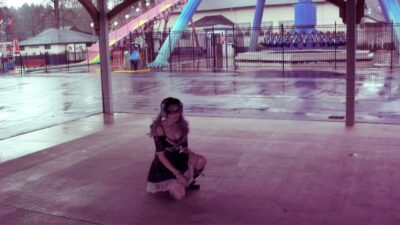

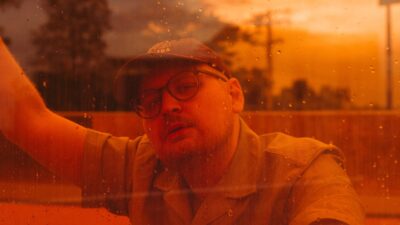


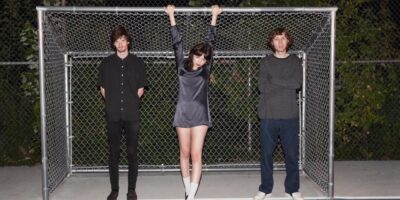

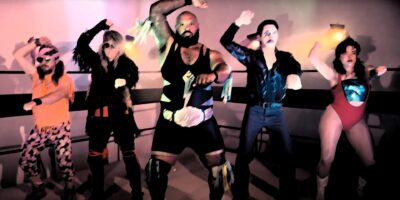


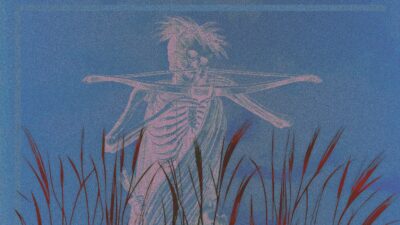
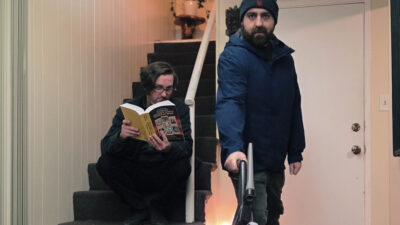
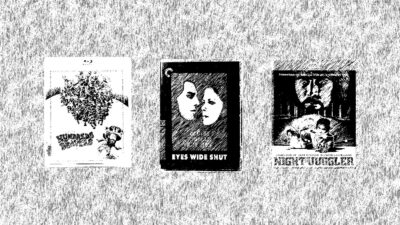

Comments